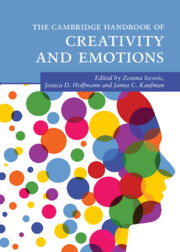Book contents
- The Cambridge Handbook of Creativity and Emotions
- Cambridge Handbooks in Psychology
- The Cambridge Handbook of Creativity and Emotions
- Copyright page
- Dedications
- Contents
- Figures
- Tables
- Contributors
- Acknowledgments
- Creativity and Emotions
- Part I Methods in the Study of Creativity and Emotions
- 1 Experimental Methods in the Study of Emotions and Creativity
- 2 Affect, Complexity, and the Case Study Method
- 3 Observational Methods in the Study of Creativity and Emotions
- 4 Assessing Creativity and Affect in Everyday Environments
- Part II The Development of Creativity
- Part III Emotions and the Creative Person
- Part IV Emotions and Creative Products
- Part V Emotions and Creativity at School and Work
- Index
- References
2 - Affect, Complexity, and the Case Study Method
from Part I - Methods in the Study of Creativity and Emotions
Published online by Cambridge University Press: 16 February 2023
- The Cambridge Handbook of Creativity and Emotions
- Cambridge Handbooks in Psychology
- The Cambridge Handbook of Creativity and Emotions
- Copyright page
- Dedications
- Contents
- Figures
- Tables
- Contributors
- Acknowledgments
- Creativity and Emotions
- Part I Methods in the Study of Creativity and Emotions
- 1 Experimental Methods in the Study of Emotions and Creativity
- 2 Affect, Complexity, and the Case Study Method
- 3 Observational Methods in the Study of Creativity and Emotions
- 4 Assessing Creativity and Affect in Everyday Environments
- Part II The Development of Creativity
- Part III Emotions and the Creative Person
- Part IV Emotions and Creative Products
- Part V Emotions and Creativity at School and Work
- Index
- References
Summary
Case study method is a crucial research tool that works in dialogue with other methodologies to identify the real-world challenges of creative work. Whereas most psychological methodologies isolate variables or measure their relative importance in predicting what is likely to happen across a population, case studies attempt to understand the systemic complexity of specific instances, describing how things can happen in order to consider why. Cases can elaborate on findings from other research, offer caveats to those findings, or raise new research questions. Affect, an important topic that both draws on researchers’ insights and tests their perspectives, exemplifies the data that case work is adept at recognizing and can offer to such a dialogue. This chapter discusses how case research can examine affect and provides examples from research on creative work using the evolving systems and participatory framework approaches. Five guiding questions are provided to help researchers integrate analyses of affect into case studies and situate those findings in relation to other research. These questions address the researcher’s philosophical stance, the possibilities and limits of a given case, the functions of affect within the case, patterns in affective systems, and the potential for both insight and bias.
- Type
- Chapter
- Information
- The Cambridge Handbook of Creativity and Emotions , pp. 30 - 46Publisher: Cambridge University PressPrint publication year: 2023
References
- 1
- Cited by

